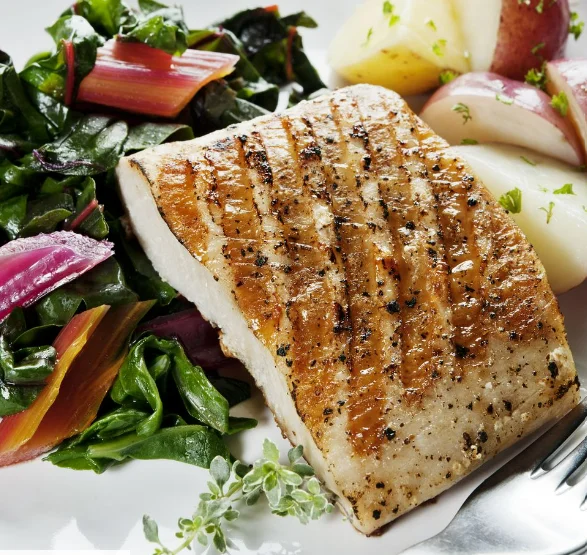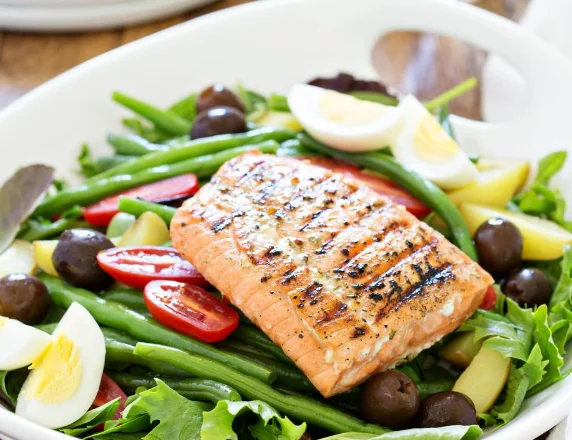The Mediterranean diet has gained a lot of attention for being an eating choice.
Its no surprise why. This diet has been proven to lower the risk of heart disease, metabolic issues, diabetes, certain types of cancer, depression and, for adults it can reduce the chance of becoming frail while also boosting physical performance.
Extensive studies have revealed that embracing a Mediterranean style eating pattern in produce, nuts, whole grains, seafood and heart healthy fats can significantly lower the risk of strokes and various cardiovascular conditions, including heart disease. It may also play a role in warding off type 2 diabetes. Consistently recognized as one of the best diets by sources like U.S. News & World Report.
What is the Mediterranean diet ?
More than a dietary regimen (thankfully devoid of calorie counting!) it represents a lifestyle inspired by those living around the Mediterranean Sea in countries such, as Greece, Italy, Spain and France.
While there are guidelines to follow there aren’t rules or limitations. The focus is, on enjoying fats and plant based meals incorporating some dairy in moderation and limiting intake of meat processed foods and added sugars.
This balanced approach to eating doesn’t require counting or cutting out your favorite foods entirely (yes you can still enjoy a glass of red wine!). Along with promoting eating habits the Mediterranean diet also highlights the importance of physical activity in your daily routine.
Mediterranean diet health benefits
The Mediterranean diet offers health benefits such as reducing inflammation and supporting cholesterol levels blood pressure regulation and gut health. A study conducted by researchers in 2013, at the University of Barcelona involving over 7,000 participants showed improvements in heart health. Another recent study suggested that older individuals could enhance brain function and longevity through adherence to this diet.
Some supported advantages of following a Mediterranean lifestyle include:
Reduced risk of heart disease.
It lowers risk of heart disease due, to the consumption of omega 3 rich fatty fish. Cutting back on meat, which contains levels of saturated fat is also recommended. The American Heart Association suggests that including fish, in your diet at twice a week can reduce the chances of developing heart disease and experiencing a stroke. Additionally adopting low sodium meal plans like the Mediterranean diet can contribute to the management and prevention of blood pressure.
Lower risk of stroke.
This dietary approach may assist in lowering LDL cholesterol levels linked to an increased stroke risk. By promoting the intake of fats like olive oil in monounsaturated fats, which can help lower LDL cholesterol while restricting saturated fats like butter and margarine that may elevate LDL levels.
Reduced risk of type 2 diabetes
Studies indicate that adhering to the Mediterranean diet could be effective in reducing the likelihood of developing and managing type 2 diabetes, by enhancing insulin sensitivity and gut health through its high fiber content and anti inflammatory properties while reducing added sugars, refined grains and non starchy vegetables.
Prevention of cognitive decline
If you’re looking to maintain an healthy mind as you age consider adopting a diet that focuses on plant based foods, like vegetables, grains, nuts, seeds, legumes and fruits. These foods are packed with vitamins, minerals, antioxidants and fiber. Research suggests that following such a diet could potentially slow down the progression of Alzheimers disease and reduce the risk of dementia.
Managing weight
While the primary aim of this approach is to promote health it can also aid in weight management. Recent studies indicate that adhering to the Mediterranean diet may lower the chances of obesity and help in maintaining or reducing weight gain along with minimizing the risk of increased waist circumference.
Decreased mortality risk
Another benefit is potentially extending your lifespan! Studies have indicated that combining the Mediterranean diet with activity can lower overall mortality risk.
Top Foods, in the Mediterranean Diet
In the Mediterranean Diet of relying on ingredients or trendy food fads this diet focuses on whole grains, fresh fruits and vegetables , lean proteins and heart healthy unsaturated fats—essentials found in many healthy eating plans.
Include an amount of fish (especially dishes, with salmon) and ample portions of beans, nuts and seeds and you’ve got a simple way to organize three satisfying meals each day.
To kick things off here’s a rundown of foods considering for your Mediterranean diet;
Consume a variety of produce such, as vegetables like broccoli, spinach and zucchini; fruits like apples oranges and strawberries; legumes, nuts and grains such as almonds, lentils and quinoa; healthy fats like olive oil; various herbs and spices including basil, garlic powder and turmeric.
Enjoy dairy products in moderation like yogurt and cheese varieties such as feta and Parmesan. Include seafood, poultry, lean cuts of meat in your diet moderately.
Stay hydrated with calorie drinks, like water or unsweetened tea. Indulge, in the occasional glass of red or white wine.
Foods to limit on the Mediterranean Diet
Here are some foods to consume sparingly while following the Mediterranean Diet. While no foods are completely off limits it’s best to enjoy these fat simple carb and sugary options only occasionally rather than daily;
Red meat
Processed meat like sausage, cold cuts and bacon
Packaged foods such as cookies, chips, boxed mac and cheese and any type of “nugget”
Sweetened beverages and candies
Refined grains like white rice, white bread, pasta and crackers
Opt for olive oil over butter
Stick to red or white wine when it comes to alcohol choices
Snacks to eat on the Mediterranean Diet
For those moments when you need a snack on the Mediterranean Diet plan that’s both satisfying and nutritious;
Pair hummus with baby carrots or cucumbers
Enjoy salsa with jicama sticks
Munch, on crispy chickpeas
Grab a handful of raspberries or blueberries
Here are some ideas, for meals on a Mediterranean diet plan that you can enjoy when dining out with friends or at a restaurant;
Opt for seafood dishes like grilled fish, shrimp or scallops from cuisines.
Choose vegetable sides and pair them with grains like quinoa, brown rice or farro.
When in a setting consider ordering a salad or eggs cooked with tomatoes, peppers, spinach and other vegetables.
Avoid indulging in the bread basket; opt for grain bread dipped in olive oil rather than butter.
To make following the Mediterranean diet easier for you , we give you ideas of some best daily Mediterranean diet meal.
This meal plan includes recipes that do not require calorie counting or strict portion control. You have the option to feast on plenty of vegetables, fruits, whole grains and legumes; savor lean sources of protein, like seafood, poultry and eggs.Treat yourself to desserts and alcoholic beverages.
As the Mediterranean diet typically emphasizes the pleasure of eating the focus is on using ingredients in these recipes that promote heart health ensuring you never feel like you’re missing out.
Here’s a guide to starting the Mediterranean diet with nutritionist approved meal ideas for breakfast, lunch and dinner.
Breakfast ideas:

Start your day with Chive and Goat Cheese Frittata recipe. Enjoy half of it now. Save the rest for tomorrows evening meal. Pair it with a side salad and an 8 ounce latte made with skim or unsweetened soy milk.

Prepare 1 cup of oatmeal by adding ½ cup of milk and hot water to suit your preference. Serve it with 1 cup of berries sprinkled with cinnamon. For added sweetness drizzle a bit of honey if desired.

For breakfast cook two eggs in any style along, with a third of a sliced avocado and one slice of 100% whole grain bread.
Lunch ideas :

For lunch enjoy the remaining sea bass from nights dinner over the rest of the baby arugula leaves.

Another lunch option is to mix half a cup of 2% Greek yogurt with half a chopped cucumber, half a garlic clove and a sprinkle of salt and pepper as desired. Spread half of the yogurt sauce on a 100% whole grain sandwich thin or pita. Pair it with one cup or more of vegetables.

As an alternative lunch idea top half of a cauliflower pizza crust with plenty of veggies (use leftovers or your preference). Half a cup of part skim shredded cheese. Accompany it with a salad containing least two cups, dressed in two tablespoons of regular dressing. Treat yourself to one scoop of your ice cream in a cone for dessert.
Dinner ideas:

For dinner tonight prepare half the Mediterranean Grilled Sea Bass recipe. Keep the other half for tomorrows lunch. Include baby arugula leaves ( bag) to increase your vegetable intake, with this meal while saving the remainder for tomorrow. For a side dish include an ear of corn and 1 cup of cooked sugar snap peas drizzled with 2 teaspoons of butter. As a treat, after your meal indulge in a fruit popsicle with around 80 calories or less.

Second Dinner option, Prepare our Mediterranean Sweet and Sour Chicken recipe and savor one serving. Pair it with 1/2 cup of rice topped with 2 teaspoons of butter accompanied by a glass of wine.

An alternative Dinner idea; When dining at your Greek eatery opt for sautéed or grilled shrimp or salmon, alongside a serving of veggies. Share an appetizer with your companions. Resist the temptation of the bread basket. Complete your meal with a glass of wine. Enjoy spirits on the rocks.
So Key Takeaways: what does the Mediterranean diet entail?
- It’s about focusing on foods commonly found in countries around the Mediterranean Sea. This nutritious diet emphasizes;
- Plenty of plant based foods like fruits, vegetables, whole grains, nuts and legumes that’re minimally processed, fresh during their seasons and sourced locally.
- Olive oil as the main source of fat.
- Moderate daily consumption of cheese and yogurt.
- Regular but moderate intake of fish and poultry a few times each week.
- Rare consumption of red meat in small portions.
- Fresh fruit as dessert option with limited intake of sugary treats or honey just a couple times per week.
- Enjoying wine in moderation, with meals.
Editor’s Note; Weight loss, health and body image are topics—while the Mediterranean diet receives support from nutrition experts it’s advisable to consult your healthcare provider before embarking on any new eating plan.















































